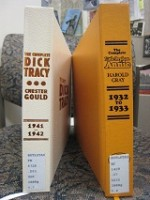Used Book Stores as Precursors to Comic Book Stores
by Jeet Heer
Tuesday, November 23, 2010
Read Comments (11)
A while back there was a discussion on the Comics Journal message board about the “first” comic book store. Two things need to be said about this conversation:
1) There’s some great research into the history of comic book stores and the direct market being done by Bob Beerbohm, so we should look forward to his findings.
2) The search for firstness seems simpleminded to me, whether it’s the first comics, the first comic strip or the first comic book. The fact is cultural institutions and forms don’t just emerge full-blown but always evolve out of earlier institutions and forms. So the first of anything can be disputed.
3) The comic book store had many precursors, including the used book store and the head shop. We need to study the history of these institutions to figure out where the comic book store came from.
In issue 57 (2000) of Canadian Notes and Queries (my favorite literary magazine), Don McLeod has a great article about Jaffe’s Book and Music Exchange in Calgary. That’s where Don used to buy old comic books. He would go on to become a distinguished expert on Canadian book history, as well as an editor and writer. With Don’s permission, I’ve scanned his article, which is well worth reading for those interested in the pre-history of comic book stores.


















